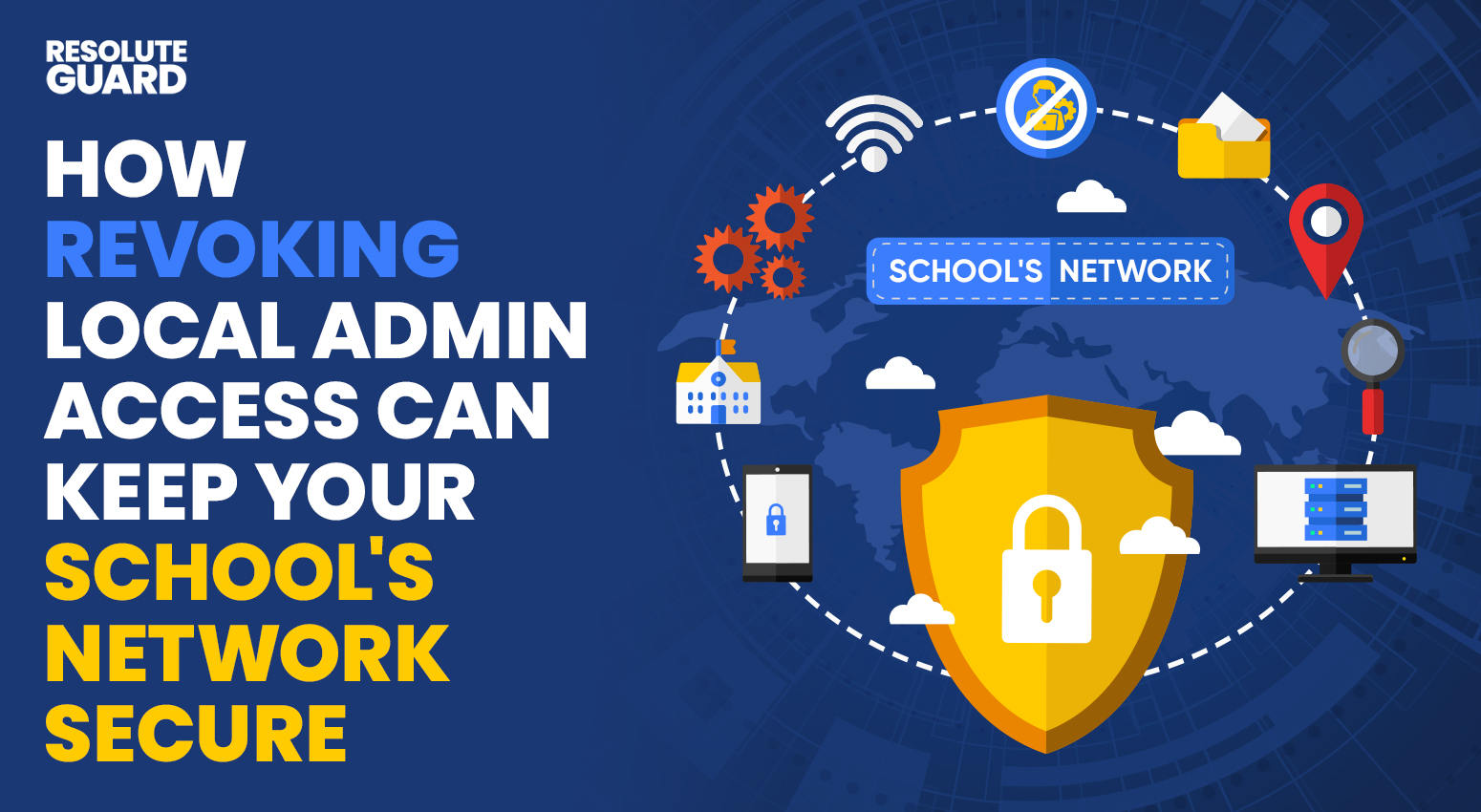Revoking Local Admin Access Can Keep Your School’s Network Secure
Revoking local admin access on school networks is a crucial step in enhancing cybersecurity. Here are several key reasons why this practice can significantly improve the security of your school’s network:
Reduction in Malware and Ransomware Risks
Local admin access allows users to install software, including malicious programs. By limiting this access, you reduce the risk of malware and ransomware infections. Without admin privileges, malware has a harder time executing and spreading across the network.
Minimized Impact of Phishing Attacks
Phishing attacks often rely on the ability to execute malicious code once a user is tricked into clicking a link or opening an attachment. Without admin rights, the damage that such attacks can cause is limited, as the malicious code cannot make system-wide changes or access sensitive areas of the network.
Controlled Software Installation
When users have admin rights, they can install unauthorized software that might not only be insecure but also incompatible with other systems. Revoking admin access ensures that only vetted and approved software is installed, reducing the risk of introducing vulnerabilities.
Enhanced System Integrity
Local admin privileges allow users to make significant changes to the system configuration, which can inadvertently disrupt network operations or weaken security. Restricting these privileges helps maintain system integrity and ensures that configurations are consistent and secure.
Simplified Compliance with Security Policies
Many regulatory frameworks and security standards require strict control over user privileges. By revoking local admin access, schools can more easily comply with these requirements and demonstrate their commitment to maintaining a secure environment.
Improved Monitoring and Accountability
When admin privileges are restricted, it becomes easier to monitor and track user activities. This enhances accountability, as actions that could potentially harm the network are limited to those with explicit authorization and oversight.
Reduced Risk of Insider Threats
Insider threats, whether intentional or accidental, pose a significant risk to network security. By limiting admin access, schools can reduce the likelihood of users exploiting their privileges to compromise the network or access sensitive information.
Consistent Application of Security Patches
Admin rights can allow users to delay or avoid applying critical security patches. Revoking these rights ensures that patches and updates are applied uniformly and timely, protecting the network from known vulnerabilities.
Facilitated Implementation of Least Privilege Principle
The principle of least privilege dictates that users should have the minimum level of access necessary to perform their duties. By revoking local admin rights, schools can better implement this principle, thereby reducing the attack surface and enhancing overall security.
Improved Incident Response and Recovery
By restricting local admin access, the potential impact of security incidents is minimized. When a breach occurs, the ability to contain and remediate the issue is enhanced because the attacker has limited privileges. This containment prevents the spread of malware and unauthorized access, enabling faster and more efficient recovery efforts.
Better Network Performance
Unauthorized software installations and misconfigurations can degrade network performance. By revoking local admin access, schools can maintain a streamlined, optimized network environment, free from unnecessary software and potential misconfigurations, leading to better overall performance.
Enhanced Data Protection
Admin rights often grant access to sensitive data and system settings. By restricting these privileges, schools can better protect sensitive information from unauthorized access and potential breaches. This is particularly important in educational environments where student data privacy is paramount.
Simplified Auditing
With fewer users having admin privileges, auditing user activities becomes simpler and more straightforward. This improved auditability helps in identifying suspicious activities more easily and ensuring that all actions are traceable to authorized personnel.
Encourages Best Practices Among Users
Revoking local admin access can foster a culture of security awareness and best practices among users. When users are aware that their actions are limited and monitored, they are more likely to follow security protocols and guidelines, contributing to a more secure network environment.
Centralized Management of Security Policies
By centralizing the management of security policies and removing local admin rights, IT departments can enforce uniform security policies across all devices and users. This centralization ensures consistent application of security measures, making it easier to manage and update policies as needed.
Decreased Maintenance Costs
Fewer administrative privileges mean fewer instances of users inadvertently causing system issues that require IT intervention. This reduction in troubleshooting and repair tasks can lead to decreased maintenance costs and allow IT resources to be allocated more efficiently.
Strengthened Network Access Control
Revoking local admin access allows for better implementation of network access control (NAC) measures. NAC ensures that only authorized devices and users can access the network, further protecting it from unauthorized access and potential threats.
Enhanced Security for Remote Work
With the increase in remote learning and work, securing remote access has become critical. Revoking local admin rights ensures that remote users cannot make unauthorized changes to their systems that might introduce security vulnerabilities. This practice helps maintain a secure connection to the school’s network and prevents potential breaches.
Prevention of Unauthorized Access
By limiting admin access, schools can prevent unauthorized users from gaining control over critical systems and sensitive data. This reduces the risk of data breaches and ensures that only authorized personnel have the ability to make significant changes to the system.
Improved Patch Management
Admin rights often allow users to delay or skip necessary updates and patches. Without these privileges, IT administrators can enforce timely updates, ensuring that all systems are protected against the latest security vulnerabilities and threats.
Better Management of BYOD Policies
Many schools allow students and staff to bring their own devices (BYOD). Revoking local admin access on these devices when connected to the school network ensures that these devices adhere to the school’s security policies, minimizing the risk of security breaches from personal devices.
Support for Zero Trust Architecture
Revoking local admin rights supports the implementation of a Zero Trust security model, which operates on the principle of never trusting and always verifying. This model limits access to the network and data resources based on strict identity verification, further enhancing security.
Increased Focus on Security Awareness
When users do not have admin privileges, they are more likely to seek assistance from IT for tasks that require elevated access. This interaction provides an opportunity for IT to educate users about security best practices and reinforce the importance of maintaining a secure environment.
Enhanced Protection Against Insider Threats
Insider threats, whether intentional or accidental, pose a significant risk to school networks. By revoking local admin access, schools can limit the potential damage that insiders can cause, protecting sensitive data and critical systems from misuse.
Consistent Application of Security Policies
Limiting admin access ensures that security policies are applied uniformly across all devices and users. This consistency helps maintain a high level of security and reduces the risk of vulnerabilities caused by unapproved configurations or software installations.
Promotion of a Security-First Culture
Revoking local admin access encourages a culture where security is prioritized. Users become more aware of the importance of following security protocols and are less likely to engage in risky behaviors that could compromise the network.
Mitigation of Zero-Day Vulnerabilities
Zero-day vulnerabilities are exploits that are unknown to the software vendor and can be highly damaging. By revoking local admin access, you significantly limit the potential damage these vulnerabilities can cause, as the exploit would not have the necessary permissions to make critical changes or install malicious software.
Controlled User Environment
Restricting admin access helps maintain a controlled user environment. This means that users are less likely to make unauthorized changes that could destabilize the system or create security vulnerabilities. A controlled environment ensures that IT administrators can enforce consistent security policies and maintain system stability.
Enhanced Network Segmentation
Without admin privileges, users are restricted in their ability to modify network settings. This helps in maintaining proper network segmentation, which is crucial for isolating sensitive data and preventing lateral movement of attackers within the network.
Prevention of Unauthorized Configuration Changes
Users with admin rights can change system configurations that could weaken security settings or interfere with network operations. By revoking these rights, you prevent unauthorized configuration changes, ensuring that security settings remain intact and consistent.
Stronger Application Control
Limiting admin access enhances application control measures. Users cannot install unauthorized applications, reducing the risk of introducing insecure software into the network. IT administrators can enforce application whitelisting, ensuring only approved software is used.
Protection Against Social Engineering Attacks
In social engineering attacks, attackers manipulate users into performing actions or divulging confidential information. Users with admin access are prime targets because of their elevated privileges. Reducing the number of admin accounts limits the potential impact of such attacks.
Improved Resource Allocation
With fewer issues arising from user-induced problems, IT resources can be better allocated. This allows IT teams to focus on proactive security measures and strategic initiatives rather than constantly addressing avoidable issues.
Support for Endpoint Detection and Response (EDR)
Revoking admin rights supports the effective implementation of Endpoint Detection and Response (EDR) solutions. EDR tools require stable and secure configurations to monitor, detect, and respond to threats effectively. Limiting admin access ensures these tools function without interference.
Facilitation of Remote Management
Without local admin access, IT administrators can manage systems remotely with greater control and security. This centralizes management efforts and reduces the risk of users making unauthorized changes that could affect remote management capabilities.
Enhanced Log Integrity
Revoking admin access ensures that users cannot alter or delete security logs. This maintains the integrity of logs, which are crucial for auditing, monitoring, and forensic analysis in case of security incidents.
Reduction in IT Support Costs
Limiting admin privileges can reduce the number of issues requiring IT support intervention. This reduction in support cases lowers operational costs and frees up IT staff to focus on more critical tasks.
Enhanced Physical Security
By preventing users from altering security settings or disabling security software, physical security measures (such as those for devices and systems) remain robust. This is particularly important in environments where devices may be more physically accessible.
Support for Role-Based Access Control (RBAC)
Revoking local admin access aligns with the principles of Role-Based Access Control (RBAC), where access is granted based on the user’s role within the organization. This ensures that users have only the access necessary to perform their job functions, enhancing overall security.
Revoking local admin access is a comprehensive measure that significantly enhances the security of a school’s network. This practice mitigates risks associated with malware, phishing, unauthorized software installations, and zero-day vulnerabilities. It ensures consistent application of security policies, supports regulatory compliance, and simplifies auditing processes. Furthermore, it promotes a culture of security awareness, facilitates centralized management, and optimizes resource allocation. By adopting these strategies, schools can protect sensitive data, maintain system integrity, and provide a secure digital environment for students and staff. Implementing and maintaining these practices requires ongoing commitment and collaboration between IT administrators, staff, and the broader school community to ensure the highest level of cybersecurity.

